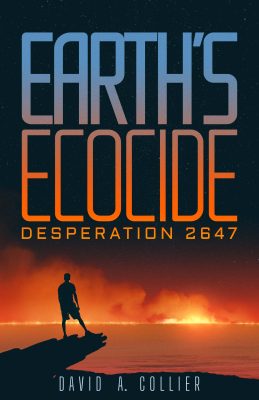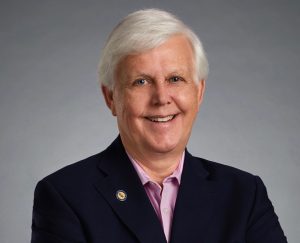Back to the Indie Corner series

The Earth’s Ecocide science fiction series is a thousand-year story of humanity struggling to cope with climate destruction and the awakening of artificial intelligence. What will life be like if global average temperatures increase 2°, 4°, or 8° Celsius? What will life be like if sea levels increase 1, 10, or 70 meters? What if both happen? The latest novel, Earth’s Ecocide: Desperation 2647, was published by Atmosphere Press .
I talked with author David A. Collier about the series.
Mary: I always like meeting others who, like me, were born in Kentucky. Do you have any nostalgia about your childhood home?
David: Oh, yes! I grew up in the middle of thoroughbred horse country near Lexington, KY. You should go to Claiborne Farm outside Paris, KY. As you drive into the farm on the left are picturesque fields and Kennedy’s Creek. The road is public for about one mile, but the farm is closed to the public.
Drive slowly and take pictures. Imagine this scene in the winter in the 1950-60s during a snowstorm and a group of brave young boys walking the frozen creek. Or sitting on a hill enjoying the splendor of the bright, colorful leaves in the cool autumn breeze. Or watching a field of thoroughbreds gallop around the lush, green summer meadows. In all cases, you learn to respect the land and animals that grace this planet. They are magnificent!
Think of me as an adventurous boy at age 12, sitting at the top of the water tower, overlooking these scenes, and watching the clouds pass, the waves of wind-blown bluegrass, and the thoroughbreds run. I played, fished, and camped in the surrounding area (Kennedy and Stoner Creek) as a young boy.
I wrote about my coming of age in this space-time arena from 1947 to 1965 in the novel Romance in My Rambler, by David A. Bourbon, my pen name. I wrote this novel to honor the town of Paris, KY, my 1965 high school classmates, and its wonderful people with strong hardworking values.
If you read the novel, you’ll learn how at five years old I fell into a well and about a 14-year-old boy who rescued me. He won the Carnegie Hero Medal (Foundation), went to New York, and was on the TV show “Kids and Company”. You’ll also learn about civil rights 1960-style, railroads, “The Honeymooners”, “Davy Crockett”, silver teeth, “The Mickey Mouse Club”, the Cuban Missile Crisis, high school integration in 1962, Sputnik, a single movie theater on Main Street, “The Twist” by Chubby Checker, high school football playoffs, sock hops, The Beatles, draft boards and Vietnam, my Rambler, and life in a small town. Sorry for the list, but this was my life.
Mary: Thanks for sharing your memories! Tell us about your academic past and why you wanted to write a novel series.
David: A native of Paris and Lexington, Kentucky, I earned two degrees at the University of Kentucky before entering the corporate world. I later returned to academic life and earned my PhD from Ohio State University. For 41 years, I taught all levels of students as well as participants in executive programs within the business schools of Duke University, University of Virginia, Ohio State University, Florida Gulf Coast University, and University of Warwick in the United Kingdom. As of early 2023, my research has attracted over 38,000 reads and 4,000 citations according to ResearchGate.
After decades of authoring award-winning research articles, business cases, and many college textbooks, I wanted a new challenge: writing novels that make a difference. I could have written a science fiction book series with no relevance to issues of the day, but I didn’t choose that path. The following quote embodies the approach I followed in academic writing and novels: “Do not follow where the path may lead. Go instead where there is no path and leave a trail” (source: unknown).
I hope you enjoy the stories in the Earth’s Ecocide book series, and that they inspire you to protect our home planet, so future generations can enjoy its majesty. Be a champoid!
Mary: I understand that your series, Earth’s Ecocide, is a three-part series, and the second book, Desperation 2647 is the latest book. The series is an epic one, covering a thousand years of humanity’s struggle with climate destruction and the awakening of AI. Can you break down what’s happening in each novel?
David: In the series, by 2147, Earth’s fragile biosphere has passed the tipping point, sea levels have risen over a meter, and temperatures have increased 3° Celsius (5.4° Fahrenheit). People try to cope with climate change as they debate and disagree on what to do. Soon a mysterious orb arrives on Earth, offering a solution to an Earth ravaged by heat and flood. But humanity must overcome the greatest obstacle: itself. The burden of salvation falls on the shoulders of the Hickory family as fractured nations, ignorant governments, and ravenous media grapple with the orb’s arrival.
In the second novel, Earth’s Ecocide: Desperation 2647, humans wear cooling vests to go outside for even short periods of time while digital assistants and robots continue to propagate and grow in intelligence. Earth’s seas have risen 8 meters, and global average temperatures over 5° Celsius. Humanity tries to cope with climate destruction as national governments collapse, nations fight over water, and billions of animals, plants, and humans die. The story ends with a unique solution for the Paris family—one of hope and eternal love.
Earth’s Ecocide: Extinction 3147 follows the story of the Torg family as it fights for survival against climate change and a second ominous antagonist, artificially intelligent robots, called the Imperium Nation. Humans live underground now as upside temperatures soar and oceans have risen seventy meters. The cost of climate change far exceeds the capability of humanity and becomes irrelevant. Temperatures on the surface of the Earth, called the upside, are unbearable for humans. Robots rule all things on the upside as humanity fights its last battle for survival.
A review said it best:
Earth’s Ecocide: Desperation 2647 by David A. Collier is full of intriguing characters, an irresistible plot, and rich detail… Sometimes it takes a work of fiction to understand the reality right in front of you…This novel by David A. Collier is more than a novel. It can effect change and influence hearts and minds.
-Tammy Ruggles, Readers’ Favorite
Mary: How important is it to you to educate people about climate through fiction?
David: I wrote the novel series to champion climate mitigation through an entertaining story.
My objectives in these stories are:
- To help awaken humanity to the realities of climate destruction over the next 1,000 years and how it might end.
- To encourage movie producers and their corporations to make emotional movies about the realities of climate destruction and why we must protect our home.
Many climate experts and champions, much more knowledgeable than me, have authored books, reports, and blogs, and given speeches on why we need to take immediate action. Many present data, graphs, and scientific arguments, and narrate well-scripted movie documentaries on the dire situation of Earth’s biosphere. It’s having some positive effect on government and corporate climate policy, laws, and actions, but it’s not happening fast enough. We need governments and officials to heed these warnings and take prompt action.
Through the stories in each novel, I try to educate the reader about the dire effects of climate change using a bit of science. I make no apologies for trying to eco-educate the audience. In fact, if I can accomplish this goal through an entertaining story, great.
For example, in Earth’s Ecocide: Desperation 2647, Chapter 1, the reader discovers that the heat-absorbing capacity of water is 3,316 times more than air. The Earth’s oceans store about 90% of Earth’s heat. This science is important for understanding global warming, and in my books are scenes such as super violent hurricanes, the release of methane by our hot oceans, and the orb’s solution of building 216 mega-machines to take heat out of Earth’s biosphere.
Another example of ecological thinking and eco-education is that global warming is a “great filter” as defined in Chapter 9. I introduce this concept as a way to structure and think about our situation in the cosmos. We would be much better off if we viewed climate change as a great filter that threatened our species’ survival. Only together can we overcome the filters that block our future.
What is missing today? A massive and global outpouring of human emotion, generating outrage and fear for what we humans do to our home planet and to our species. We need to create a strong emotional connection between our home planet and all people as soon as possible.
Who knows how to create such a powerful emotional connection? Answer: Movie producers and their corporations. Science fiction novels, movies, and other visual and entertaining stories can help create champions. Many actors already support sustainability and climate mitigation initiatives, but my focus is on the organizations and movie producers that make and fund these movies.
I call such emotional champions—champoids. What is a champoid?
A champoid is a person who champions our humanoid species and supports and protects Earth’s biosphere. Being a champoid is much more than a political, legal, economic, national, or moral view or cause. It is a determined way of thinking and acting that accepts that all things are connected and must be protected and nourished to ensure survival. Through their beliefs and actions, champoids support all life-forms and what some may call non-life. A champoid believes, for example, that the Earth’s rare, balanced, fragile, and priceless biosphere is a living set of interrelated systems that makes life possible for all species. We must protect our home.
Mary: Did you have any favorite authors growing up?
David: I spent most of my early academic years reading math and science and astronomy. My favorite college engineering course was thermodynamics. We studied how the heat shield on the Mercury capsule worked. I’ve read H.G. Wells and Ernest Hemingway’s novels, and of course, everything I could find on operations, quality, and logistics management for my research and textbooks. I read astronomy, artificial intelligence or genetics articles each day. I’m always reading and pondering our future.
Mary: If your book ever became a movie, would you have a dream cast?
David: Earth’s Ecocide: Desperation 2647
• Vela: Molly Parker
• Livia: Jennifer Lawrence
• Kutter: Will Poulter
• NILA (home comfort robot voice only): Helen Mirren
• Dr. Hamlet: Denzel Washington
• BEAST8 (short segment; voice over): James Earl Jones
• Plato (several long segments; voice only): Morgan Freeman
• Orb (Jill Hickory 8-year-old female angelic voice only beginning in Earth’s Ecocide: Hope 2147): I do not know, but a very important voice and role in the science fiction adventure series!
Mary: Interesting. Thanks so very much, David.

Author David A. Collier earned his PhD from The Ohio State University. For 41 years, he taught all levels of students as well as participants in executive programs within the business schools of Duke University, University of Virginia, Ohio State University, Florida Gulf Coast University, and University of Warwick in the United Kingdom. His research has attracted over 37,000 reads and 4,000 citations. After decades of authoring award-winning research articles, business cases, and five college textbooks, he wanted a new challenge: writing novels that make a difference. David is the author of a science fiction series, Earth’s Ecocide (www.theentity.us), as well as Romance in My Rambler under the pen name David A. Bourbon. Follow David on Twitter, LinkedIn, website, Etsy, and the Earth’s Ecocide novel series.